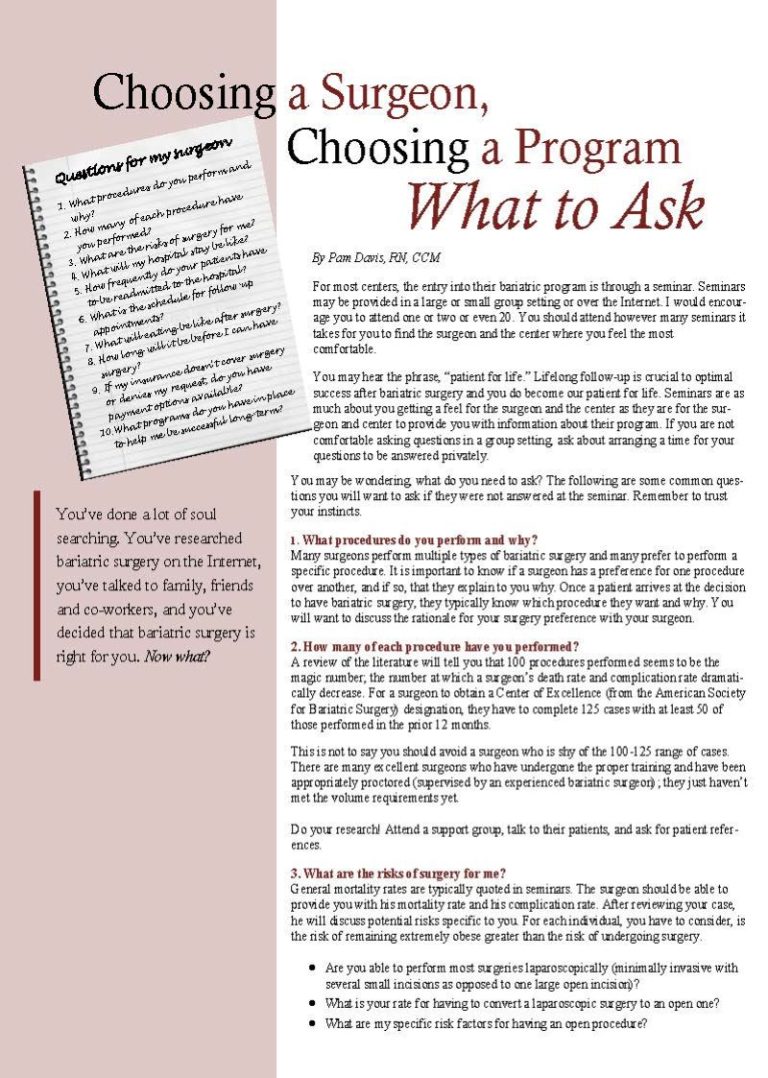Choosing a Surgeon, Choosing a Program – What to Ask


By Pam Davis, RN, CBN, MBA
Spring 2007
For most centers, the entry into their bariatric program is through a seminar. Seminars may be provided in a large or small group setting or over the Internet. I would encourage you to attend one or two or even 20. You should attend however many seminars it takes for you to find the surgeon and the center where you feel the most comfortable.
You may hear the phrase, “patient for life.” Lifelong follow-up is crucial to optimal success after bariatric surgery and you do become our patient for life. Seminars are as much about you getting a feel for the surgeon and the center as they are for the surgeon and center to provide you with information about their program. If you are not comfortable asking questions in a group setting, ask about arranging a time for your questions to be answered privately.
You may be wondering, what do you need to ask? The following are some common questions you will want to ask if they were not answered at the seminar. Remember to trust your instincts.
1. What procedures do you perform and why?
Many surgeons perform multiple types of bariatric surgery and many prefer to perform a specific procedure. It is important to know if a surgeon has a preference for one procedure over another, and if so, that they explain to you why. Once a patient arrives at the decision to have bariatric surgery, they typically know which procedure they want and why. You will want to discuss the rationale for your surgery preference with your surgeon.
2. How many of each procedure have you performed?
A review of the literature will tell you that 100 procedures performed seems to be the magic number; the number at which a surgeon’s death rate and complication rate dramatically decrease. For a surgeon to obtain a Center of Excellence (from the American Society for Bariatric Surgery) designation, they have to complete 125 cases with at least 50 of those performed in the prior 12 months.
This is not to say you should avoid a surgeon who is shy of the 100-125 range of cases. There are many excellent surgeons who have undergone the proper training and have been appropriately proctored (supervised by an experienced bariatric surgeon); they just haven’t met the volume requirements yet.
Do your research! Attend a support group, talk to their patients, and ask for patient references.
3. What are the risks of surgery for me?
General mortality rates are typically quoted in seminars. The surgeon should be able to provide you with his mortality rate and his complication rate. After reviewing your case, he will discuss potential risks specific to you. For each individual, you have to consider, is the risk of remaining affected by obestiy greater than the risk of undergoing surgery.
- Are you able to perform most surgeries laparoscopically (minimally invasive with several small incisions as opposed to one large open incision)?
- What is your rate for having to convert a laparoscopic surgery to an open one?
- What are my specific risk factors for having an open procedure?
Laparoscopic surgery has many advantages over an open procedure: smaller incisions mean less pain, less likelihood of developing a hernia, a shorter hospital stay and a quicker return to your pre-surgery activity level.
Men, who tend to have more fat tissue overlying their abdominal organs; those with central obesity (apple shaped) and those who have had previous abdominal surgery (increased likelihood of scar tissue), may be at a higher risk for an open procedure.
It is also important to remember that any time you are scheduled for a laparoscopic procedure (whether it’s to have your gallbladder or appendix removed, or to have bariatric surgery), there is always some risk of your surgery needing to be converted to an open procedure.
That being said, please keep in mind having an open procedure is not the end of the world. It does increase the risk of issues with wound healing and the risk of developing a hernia, it may increase your hospital stay by a couple of days and it will likely delay your return to work.
4. What will my hospital stay be like?
Your length of stay in the hospital will vary depending on which procedure you have and your response to that procedure. A patient undergoing laparoscopic adjustable gastric banding may go home the same day or stay overnight in the hospital whereas a patient having a laparoscopic gastric bypass may be in the hospital two to four days. Patients who have open procedures may be in the hospital up to one week or longer.
You should also ask about who will be providing your care while in the hospital. Do all bariatric surgery patients go to a designated unit in the hospital where the staff has been trained specifically in the care/needs of the bariatric surgery patient?
The facility may not have a unit that has only bariatric surgery patients; however, there should be a designated unit or floor with staff specifically trained to care for bariatric surgery patients.
5. How frequently do your patients have to be readmitted to the hospital?
This can vary a great deal depending on the procedure you choose; at what point you are originally discharged from the hospital and how compliant you are with the discharge instructions you are given. Some readmissions are unavoidable. Careful adherence to the discharge instructions, specifically the diet recommendations, will help you to decrease the likelihood of having to return to the hospital.
6. What is the schedule for follow-up appointments?
The schedule will vary depending on the procedure and the surgeon. In general, you should expect to have your first follow-up appointment within two weeks of surgery. Bariatric surgery is not like getting your gallbladder out. You don’t just see the surgeon once before surgery and once after surgery. There should be an established routine for when you will be seen in follow-up, for when laboratory tests will be drawn and for continued dietary counseling.
7. What will eating be like after surgery?
Your surgeon should be one part of a whole bariatric surgery program. The program should include (at minimum) access to a/an:
- Registered dietitian
- Nurse
- Exercise specialist
- Mental health counselor
All of these people are there to help you transition your diet before surgery and to educate you regarding how to make the appropriate lifestyle changes to ensure success after surgery.
8. How long will it be before I can have surgery?
Each program will have a variety of steps you will go through prior to surgery. Typically, attending a seminar, undergoing a psychiatric evaluation, participating in a support group and receiving dietary counseling are all a part of the preparatory process. Much of this will need to be completed prior to submitting your request to your insurance company. Frequently, the greatest time variance is the insurance approval process. Depending upon your carrier, approval can take as little as 24 hours or up to eight weeks or longer.
9. If my insurance doesn’t cover surgery or denies my request, do you have payment options available?
Few surgeons will offer direct financing through their office or center. Many do participate with financial institutions that offer healthcare financing. Other possible options are home equity loans, borrowing against your retirement fund or a personal loan.
At first glance, it may seem that surgery is cost prohibitive, however when you consider many people spend a similar amount on a new automobile and five years later have little to show for it, five years after surgery you will have improved health.
10. What programs do you have in place to help me be successful long-term?
As mentioned earlier, your bariatric surgeon is but one component of your success. A Center of Excellence program will provide you with access to support groups, dietary counseling, and continued education specific to your needs.
About the Author:
Pam has been a registered nurse for 13 years and certified case manager for seven years. Pam is currently employed as the bariatric program coordinator for Baptist Metabolic Surgery Center in Nashville. In 2001, Pam had laparoscopic gastric bypass surgery and has since developed a passion for working with those affected by obesity. Pam also co-authored a resource path on morbid obesity for CMSA (Case Management Society of America). Pam is a member of the OAC Board of Directors.
by Robyn Pashby, PhD Winter 2024 “No one is ever going to date you if you don’t…
Read Articleby Kendall Griffey, OAC Communications Coordinator Winter 2024 The Obesity Action Coalition’s 12th annual Your Weight Matters…
Read Articleby Nina Crowley, PhD, RD (with Inspiration from Shawn Cochran) Winter 2024 Dating, no matter your age,…
Read Article









